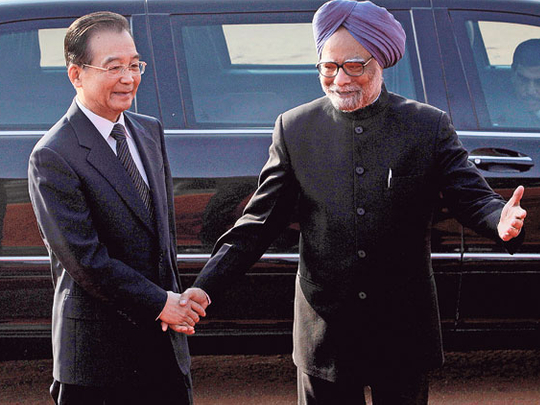
Apples and oranges do not compare. Likewise, it would be inappropriate to compare Chinese President Hu Jintao's four-day visit to the US in January with that of Chinese Premier Wen Jiabao's three-day visit to India in November last year.
There is a degree of triangularity in Washington's relationship with both Beijing and New Delhi and vice versa, and between both New Delhi and Beijing.
If India fears encirclement by China in South Asia through Beijing's overt and covert support to Pakistan and its increased strategic footprint in Sri Lanka, Nepal and Bangladesh, China is equally wary of India's engagement in Southeast Asia alongside the US and Japan.
If there is distrust and suspicion between the US and China, the same emotions underlie relations between India and China — only the degree varies.
It was in this backdrop and the trust deficit between both US-China and India-China that Jintao visited the US and before him, Jiabao visited India.
From 2000 to 2005, Sino-Indian relations had improved considerably. Not only were there frequent high-level contacts and exchanges of visits, but also diplomatic successes like China's official recognition of Sikkim as an integral part of India in 2003.
Sinologists attribute the post-2005 hardening of Beijing's stand towards India to rapidly improving Indo-US relations that impelled Beijing to perceive them as a hedge against China.
Fortunately, Indian Prime Minister Manmohan Singh's personal chemistry with the Chinese leadership particularly with Jiabao whom he has met 11 times in last six years, has ameliorated relations somewhat.
His diplomatic finesse in articulating India's foreign policy posture and his delicate handling of India's relationship with both the US and Japan has somewhat bridged Beijing's trust deficit with New Delhi.
Easing concerns
India seems to have managed a fine balancing act in its relations with the US and China. When President Barack Obama visited India in November last year, there was some suspicion and anxiety in Beijing about the intent of the visit.
However, the visit was perceived by Beijing more in terms of the economic and political narrative of two countries rather than through the lenses of a security paradigm. The defence contracts between the US and India were viewed as augmenting job opportunities in the US, not as an arms race against China.
Chinese suspicion of an Indo-US strategic partnership seems to be slowly mellowing down, or at the very least revealing a China that is coming to terms with it. Indeed, there seems to be signs of a maturing of the triangular relationship. It is against this backdrop that the recent bonhomie between Jintao and Obama augurs well for Sino-Indian relations as well.
An improved relationship and increased trust between the US and China should dispel Beijing's suspicion of Indo-US strategic ties, a state of affairs which should facilitate and promote a better relationship between India and China.
However, there is some wariness that an improved Sino-US relationship may push India to play second fiddle in the triangular relationship between India, China and the US. However, the action of the US in the recent past suggests otherwise.
It is worth remembering that Washington used its leverage to persuade Beijing to secure a waiver for the Indo-US nuclear deal at the Nuclear Suppliers Group (NSG) in Vienna.
Even during the Kargil war where the US stood with India, China maintained its neutrality. These recent events suggest that there can be a strategic convergence of interests at least on some issues. It is evident that stakeholders in the region stand to gain through a process of engagement between these major powers rather than a hedging or containment strategy.
This is, however, easier said than done and sounds rhetorical and idealistic. If diplomacy is war by other means, then the status quo calls for astute diplomacy, sensitivity and mutual adjustment of self-interest.
Rupnarayan Das is a Senior Fellow at the Institute of Defence Studies and Analyses, New Delhi, where he is a member of the institute's China cluster.









